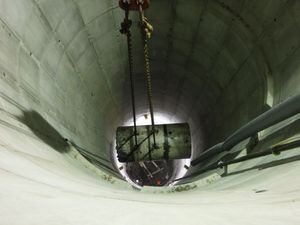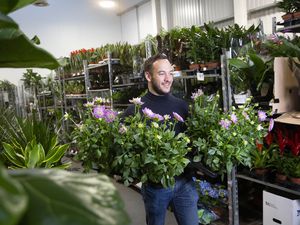Barhale tunnels under the Thames for new gas pipe
A Black Country civil engineering firm has broken through on a 330 metre tunnel under the Thames for a new gas pipe.

Barhale, based in Walsall, tunnelled from under the river from Chelsea to Battersea Park for new pipe for Cadent, Britain’s newest and largest gas distribution company.
Forming a critical part of Cadent’s £1 billion programme to replace ageing infrastructure in the capital, the tunnelling took just over three weeks to complete and saw around 4,500 cubic metres of material excavated.
To prepare for the tunnelling, the firm sank two 30m shafts for Cadent’s strategic partner tRIIO, who contracted in Skanska Civils and Mott MacDonald as designers. One shaft was in the grounds of the Royal Hospital Chelsea and the other in Battersea Park, south of the Thames.
“This is a key infrastructure project,” said Andrew Hejdner, project manager for Cadent. “It’s a major commitment by Cadent and will guarantee gas supplies and help ensure that London remains one of the world’s leading cities.”
The new pipework is intended to help ensure Londoners retain safe and reliable gas supplies for cooking and heating.
Before lowering the tunnel boring machine, or TBM, into the shaft in the hospital grounds, the Chelsea Pensioners were asked to name the piece of equipment to be used in Cadent’s flagship project.
The pensioners chose to name the machine Amanda, after the Royal Hospital Chelsea Infirmary business manager Amanda Lord, who has worked at the hospital since 2009.
“Amanda is a well-loved member of staff and does a lot to support us as pensioners,” said Chelsea Pensioner Tom Mullaney.
“I thought she would be delighted to be nominated by the pensioner community as she is always in the background never in the fore and deserves recognition. One thing I do have to clarify is that she’s certainly not boring.”
The TBM was controlled remotely by an above ground operator to carve out the 330m long tunnel.
“As the tunnel was the deepest pipejack ever attempted under the river Thames, specific measures were put in place to mitigate for the ground conditions and confined environment of working in central London,” said Ovi Frunza, Barhale's contracts manager.
The tunnelling project has been a significant administrative and logistical challenge with discussions held with 15 different organisations, securing 20 permissions, while working around major projects such as Thames Tideway, the Chelsea Flower Show and the art fair Masterpiece.
Based at Barhale House in Bescott, Walsall, Barhale is an £130m-a-year company employing over 800 people nationwide.
Founded by chairman Dennis Curran in 1980, the group was originally set up as a specialist tunnelling contractor but has expanded into wider infrastructure and civil engineering work providing design, construction and maintenance services.





